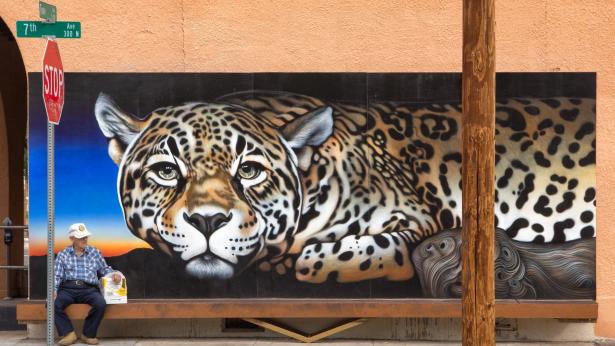With the end of the pandemic-era Title 42 that allowed the United States to turn away asylum seekers, the Biden Administration’s own similarly draconian measures that could replace it, and a humanitarian crisis that continues to rage at the U.S.-Mexico border—few may be aware of another, non-immigration related disaster brewing there. That is, the possibility that Congress may soon open up these lands to a slew of destructive mining projects.
In 2016, trail camera footage was released of a young male jaguar prowling the Santa Rita Mountains about twenty miles south of Tucson, Arizona. Nicknamed El Jefe (“The Boss”), the cat caused an international sensation. Not only was the video proof that jaguars were crossing the border and coming as far north as forty miles into the United States, it was compelling evidence that at least one of these rare and endangered animals was roaming around the site of the proposed open-pit Rosemont copper mine.
El Jefe, one of at least seven jaguars documented north of the border since 1996, became a powerful symbol for environmentalists, Native tribes, and others who vehemently oppose both mining and border wall construction in remote areas. His presence energized the decade-long court battle to prevent Canadian mining giant Hudbay Minerals from turning the eastern slope of the Santa Rita mountains, where the mile-wide mine is set to be built, into an industrial wasteland.
Under the Biden Administration, border wall construction in wilderness areas that raced ahead during the Trump years has slowed or stopped. Still, conservationists say much damage has already been done and the walls need to be taken down. As for the Rosemont mine, which has been stalled since a district court ruling in 2019, a bipartisan bill recently introduced in Congress threatens to give the go-ahead to this and other controversial mining projects.
The bill, brought to the floor in late April by Senators Catherine Cortez Masto, Democrat of Nevada, and James Risch, Republican of Idaho, and co-sponsored by Arizona Independent Kyrsten Sinema, among others, would overturn the court’s ruling in the Rosemont case and potentially open up two other delayed mining projects in Nevada.
Environmentalists are outraged and disappointed with Cortez Masto. “[The senator] has become a mining industry puppet and is throwing communities, tribes and wildlife under the bus,” Patrick Donnelly, Great Basin director of the Arizona-based Center for Biological Diversity, told the Associated Press.
The bill seeks to update and clarify the archaic 1872 Mining Law, which allows pretty much anyone, including foreign mining companies, to search for minerals under public lands and own whatever they find. But rather than rein in mining interests, it gives them even more power.
The legislation would reverse the district court’s ruling, later upheld by the Ninth Circuit, which found that mines may have the right to extract minerals from public lands proven to have deposits, but do not have the right to dump tailings on adjacent lands that do not have deposits. Mining companies say if this is the standard, they won’t be able to operate. Rosemont opponents say that’s fine with them.
Rosemont is not the only controversial Arizona mine currently under consideration by Congress. Oak Flat, the site of another proposed open pit mine near Superior, has been a subject of intense debate because the land is a popular recreation area and considered sacred to the Apache. It had been protected from development until a 2014 deal brokered by former Arizona Senators John McCain and Jeff Flake transferred the site to an Australian mining firm that had previously employed Flake as a lobbyist.
Representative Raúl Grijalva, an Arizona Democrat who also opposes Rosemont, has introduced a bill to undo the land transfer and save Oak Flat. In April, he joined tribal leaders and others at a vigil in front of the White House. “We’re here to pray that Biden reverses the destruction of a sacred site,” Grijalva said.
Even the Arizona mountain range near the border where El Jefe likely crossed is under threat from mining. The Australian-owned Hermosa project, an open-pit zinc, silver and manganese mine in the Patagonia Mountains about eight miles north of the border, has just been fast-tracked under a rapid-permitting process put in place during the Obama Administration.
Rosemont is going forward under another name: Hudbay has started mining on private land it bought on the western slope of the Santa Ritas and renamed the project Copper World. But that effort has also been tied up in court over improper permits and potential damage to the region’s underground aquifer.
As the fights over mining and the border walls rage on, there is some good news. In November 2021, El Jefe, then thought to be about twelve years old, was caught on camera in the rugged mountains of central Sonora, more than 100 miles south of the border. (In addition to enormous ranges, jaguars have unique spot patterns, so experts are sure it’s the same cat.)
It’s reassuring to know El Jefe and other jaguars are still out there, crossing the line—for now.
Miriam Davidson is author of The Beloved Border: Humanity and Hope in a Contested Land (University of Arizona Press, 2021).
Since 1909, The Progressive has aimed to amplify voices of dissent and those under-represented in the mainstream, with a goal of championing grassroots progressive politics. Our bedrock values are nonviolence and freedom of speech.
Based in Madison, Wisconsin, we publish on national politics, culture, and events including U.S. foreign policy; we also focus on issues of particular importance to the heartland. Two flagship projects of The Progressive include Public School Shakedown, which covers efforts to resist the privatization of public education, and The Progressive Media Project, aiming to diversify our nation’s op-ed pages. We are a 501(c)(3) nonprofit organization. Donate


Spread the word